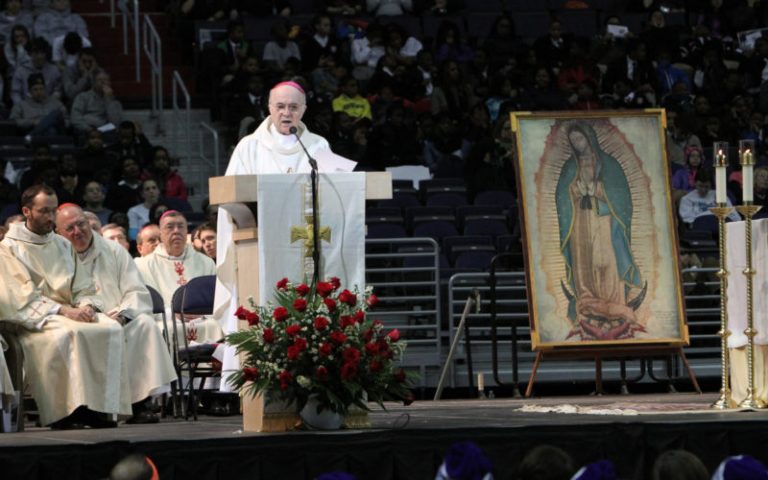Former US nuncio Archbishop Vigano joined the Kazakhstan bishops in an apparent response to Pope Francis
Five bishops have reaffirmed the Church’s traditional teaching on Communion for the divorced and remarried, in an apparent response to recent statements from Pope Francis.
The statement was originally issued by three Kazakhstan bishops – Tomash Peta, Archbishop of Saint Mary in Astana, Jan Pawel Lenga, Archbishop-Bishop of Karaganda, and Athanasius Schneider, Auxiliary Bishop of Saint Mary in Astana – on December 31, which, they observed, was the Feast of the Holy Family in the centenary year of Fatima.
Yesterday two Italian prelates – Archbishop Carlo Vigano, the former papal nuncio to the United States, and Archbishop Emeritus Luigi Negri – added their signatures, according to the website Corrispodenza Romana.
The statement, which has been published on several websites, notes that some bishops’ conferences have said divorced-and-remarried Catholics may receive Communion, even if still living in a sexual relationship with their new partner.
The traditional teaching of the Church, reaffirmed by Popes John Paul II and Benedict XVI, is that the remarried can only receive Communion if they resolve to refrain from sexual relations.
While some bishops have recently upheld this teaching, others, such as the two bishops of Malta, have contradicted it. The Maltese bishops claimed that avoiding sex may be impossible, and that those who decided they were “at peace with God” could receive Communion. The Pope has reportedly praised this statement.
An ambiguous document from the Buenos Aires bishops has been interpreted by some commentators as contradicting the traditional teaching, although others disagree. Pope Francis has given this document public approval.
In the new statement, the five bishops said that some episcopal documents supporting Communion for the remarried had “received approval even from the supreme authority of the Church”, presumably a reference to the Pope’s statements.
In response, the five bishops reiterate traditional teaching, placing in bold type the words:
It is not licit (non licet) to justify, approve, or legitimize either directly or indirectly divorce and a non-conjugal stable sexual relationship through the sacramental discipline of the admission of so-called “divorced and remarried” to Holy Communion, in this case a discipline alien to the entire Tradition of the Catholic and Apostolic faith.
The bishops argue that the tradition of the Church on Communion for the remarried is binding, because it follows Jesus’ teaching on marital indissolubility. There cannot be a contradiction, the bishops say, between “the discipline of the sacraments and and the faith of the Church in the absolute indissolubility of a ratified and consummated marriage.” They quote the Second Vatican Council as teaching that “The sacraments not only presuppose faith, but by words and objects they also nourish, strengthen, and express it; that is why they are called ‘sacraments of faith’.”
Last year, the three Kazakh bishops urged Catholics to pray for Pope Francis, and in particular to pray that he rescind pastoral guidelines which contradict Church teaching. They said that the sacramental discipline is a “proven custom, received and faithfully kept from the time of the Apostles and more recently confirmed in a sure manner by St John Paul II … and by Pope Benedict XVI.”
In their new document, the bishops look more closely at the theological foundations of the teaching. They refer to another document of St John Paul II’s, Reconciliatio et Paenitentia, which, with reference to the remarried, says: “The church can only invite her children who find themselves in these painful situations to approach the divine mercy by other ways, not however through the sacraments of Penance and the Eucharist until such time as they have attained the required dispositions.”
John Paul said that the Church was unable to alter this discipline because of two principles: first “compassion and mercy”, and second “truth and consistency, whereby the church does not agree to call good evil and evil good”.
The Italian politician and philosopher Rocco Buttiglione has argued that a priest could, instead of giving absolution, tell certain penitents that they are not in a state of mortal sin. The priest would encourage the penitent to receive the Eucharist even if they decide to carry on committing grave sins. But the Kazakh bishops cite the Council of Trent as teaching that “The Church does not possess the infallible charism of judging the internal state of grace of a member of the faithful.”
As a consequence, they say, the “non-admission to Holy Communion of the so-called ‘divorced and remarried’ does not therefore mean a judgment on someone’s state of grace before God”. Rather, it is “a judgment on the visible, public, and objective character of their situation”. Because the sacraments and the Church are visible institutions, “the reception of the sacraments necessarily depends on the corresponding visible and objective situation of the faithful.”
The bishops make the statement “before our conscience and before God who will judge us”, and say they are convinced that their profession is a service to the Church and the Supreme Pontiff.
http://www.catholicherald.co.uk/news/2018/01/03/five-bishops-reaffirm-traditional-teaching-on-communion/







